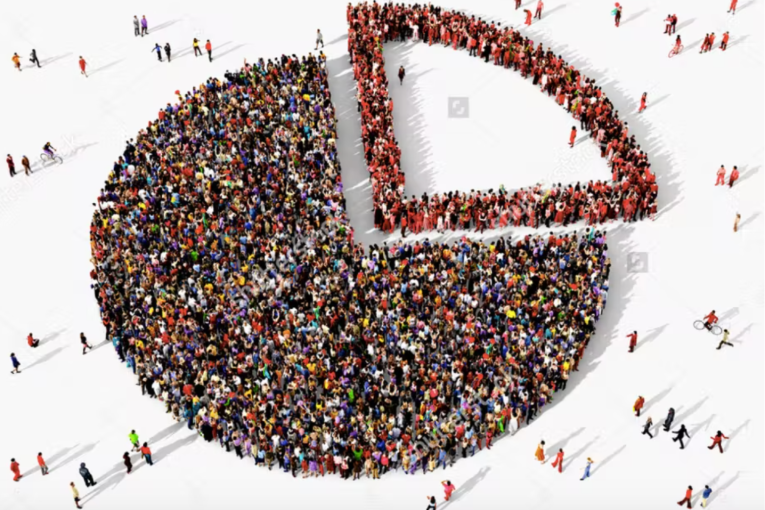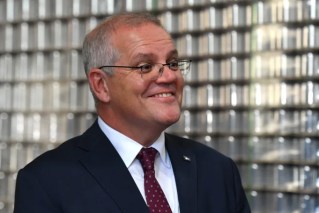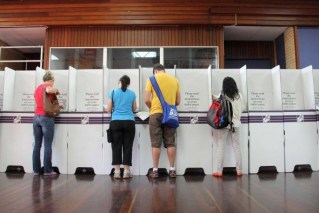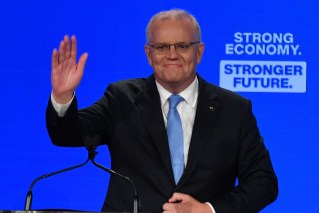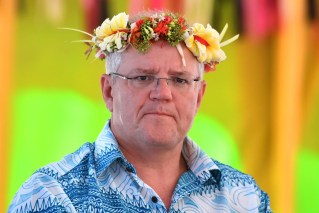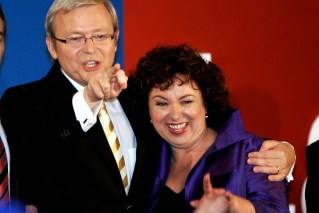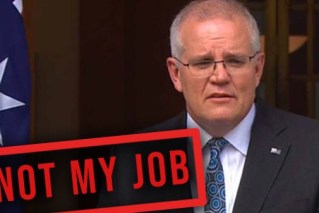There won’t be another Work Choices, but still plenty to be learned from Kevin 07
Fifteen years ago Work Choices played a big role in the election of Labor and Kevin Rudd, just the third time the ALP has won from opposition since the Second World War. Dennis Atkins picks over this campaign to see if there are any echoes.
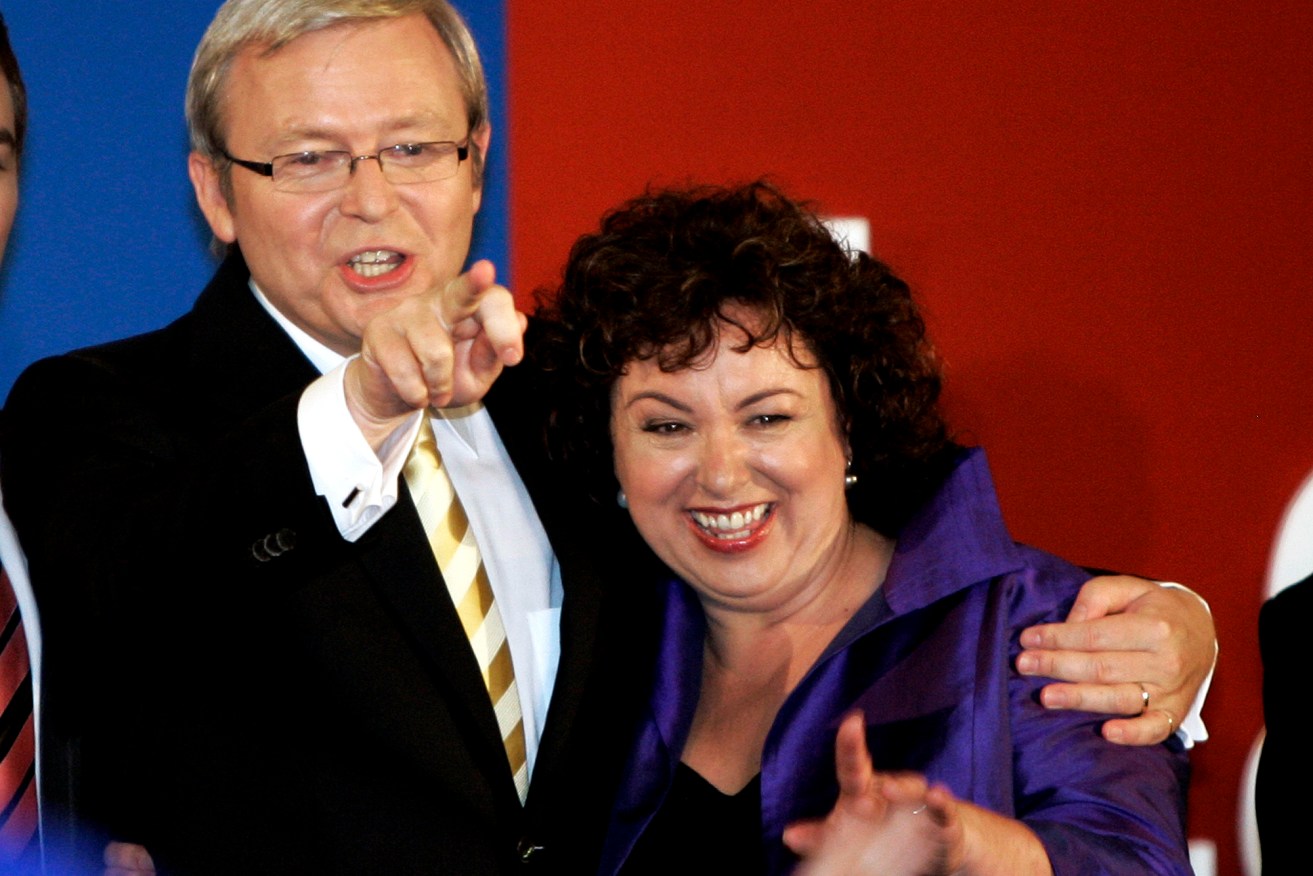
Australia's new Prime Minister Kevin Rudd points to supporters as he and his wife Therese Rein celebrate during his acceptance speech following his victory in the 2007 federal election, in Brisbane, Australia, Saturday, Nov. 24, 2007. (AP Photo/Rob Griffith)
The last time Labor won government from opposition the wave it surfed was called Work Choices, a policy and political overreach discussed around kitchen tables, in every cafe and during smoko in crib rooms.
If Anthony Albanese wins on Saturday week it will again be down to surfing a wave. The tide will come because people are over Scott Morrison and the cost of living has peaked as an issue.
Where there was Work Choices 15 years ago, there is today a decade of stagnant and shrinking real wages chasing out of control costs at the supermarket, the petrol station and in the quarterly power bills.
Scott Morrison can’t do much about turning around sentiment towards himself. He is who he is and is singularly stubborn and blind to criticism to the extent he can’t admit mistakes or say sorry.
Morrison wanted a six week election campaign because he thought it was the only way to run Anthony Albanese down. He’s used his time as well as could be expected, helped by the Labor leader’s missteps and stumbles.
The flip side of this has potential downside for Morrison and the Coalition. To prosecute his messages and attacks on Albanese, the Coalition leader has to front up every day, ensuring he’s up in lights on the six o’clock news. This carries a big risk of entrenching and amplifying pre-existing negatives.
Meanwhile, the elephant in the room keeps roaming in the background, middle ground and foreground of the election campaign.
Prices have been going up for the last 18 months, driven by global shortages that were directly or indirectly part of the global shock accompanying the covid pandemic and then supercharged by the economic aftermath of that event.
Subsequent unfinished business, such as dealing with China’s belligerent zero-covid strategy, has made matters worse.
All this was before the security and military crisis that grew over our summer and then flipped into war on February 24 with the Russian invasion of Ukraine.
The cost of everything from fuels, grains, commodities through to new and second hand cars, computers and the chips in them, coffee and food jumped whether it was in future orders, landed in containers and in the supermarket aisles.
As well as all this lifting inflation to levels not seen for 21 years, these additional costs are now pushing up interest rates creating a potential spiral, especially with further public spending embedded in billions in election promises and budget bribes.
Making it all worse has been a decade of stagnant or falling real wages and flat-lining productivity.
It took Albanese and Labor a couple of days to get their position on wages in place but they did by the middle of this week. Labor says they want a Fair Work Commission outcome in the upcoming minimum wage case that keeps pace with price rises – that is inflation – and no one left behind.
It kicked off a frenzy of commentary and attack. Morrison has grabbed it like a drowning sailor sighting a weather-beaten life raft, business groups have predicted doom and gloom, the usual suspects in media ranks also see it as the turning point which could be the lifeline the Coalition has been scrambling around to grab.
Many of these same people were in there in 2019 backing the Howard Government’s Work Choices, dismissing protests by federal Labor and the ACTU, these policies were making jobs less secure and putting wages under threat, especially penalty and other shift rates.
There’s a sense things now are not that dissimilar to what happened in 2007. One difference is the enthusiasm that surrounded Kevin Rudd’s pitch for the prime ministership – maybe 10 days of prosecuting the case for a wage rise and a concurrent one (albeit much more nebulous) to put downward pressure on the cost of living.
The most recent polling (not including the YouGov mega MRP survey which is something else again) and the way the third, more civil and more informative debate panned out suggests the mood is shifting the way of Albanese.
Both Albanese and Morrison will be chasing voters over these final days at the same time pre poll voting is happening at record levels.
About 960,000 pre poll votes were cast in the first three days of this week – early voting opened for business on Monday morning. This is three times the number of similar votes cast from Monday to Wednesday in the first week of pre poll voting in 2019, which is a measure of quite some enthusiasm.
There’s no scientific evidence of what this means but both major parties believe it could point to a mood for change. People are getting out early because they’ve made up their minds and they are keen to get this off their to do list.
It could be one more bad omen for Morrison in a contest that has its fair share of those.
